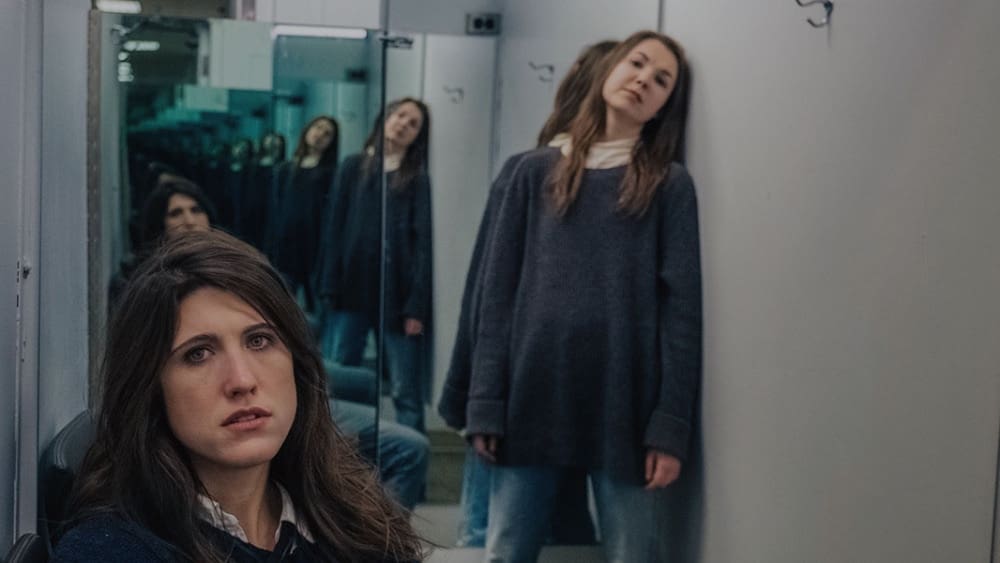
There aren’t a lot of compliments harder to take than, “Hey, great eulogy.” Regardless of how sincere the compliment is, it’s can only make the person hearing it so happy. It’s hard to describe the complex emotions involved in writing a eulogy, let alone delivering it. You have to try to honor the person who’s died, work through your own emotions and say something that will speak to everyone else loss too. Director Patricia Rozema’s new film Mouthpiece attempts to capture that experience.
It follows Tall Cassandra and Short Cassandra (Amy Nostbakken and Norah Sadava, respectively, who adapted the script with Rozema from their play of the same name), who wake up from a night of partying to discover that their mother, Elaine (Maev Beaty), has died unexpectedly. Thanks to some unspecified incident at the family Christmas party a few days prior, everyone discourages the Cassies from doing the eulogy even though they’re the “writer in the family.” However, the Cassies insist and the film spends most of its runtime watching them come to terms with their feelings about their mother while writing the eulogy between various funeral arrangements.
To start, it’s important to clarify exactly who Tall and Short Cassie are to each other. At first, it seems like they’re very close sisters. They do everything together, from getting around Toronto on the same bike to sharing a bath after they learn of their mother’s death. They’re so in sync that sometimes, they even say or do the exact same thing at the exact same time. When they’re walking through a department store carelessly dragging their scarves on the ground, they both trip and recover in the exact same way and much of the film’s appeal comes from marveling at how Nostbakken and Sadava make their connection seem effortless. That said, it’s the ways the Cassies differ that slowly reveals how they relate to each other.
Short Cassie is sensitive to the point of damaged, but she’s also responsible. Tall Cassie is rebellious and takes delight in hurting people—even herself. When they’re shopping for food for the wake, it’s Short Cassie who tells Tall Cassie to stop flirting with some guy and focus on the shopping list. When the act of writing the eulogy seems insurmountable, it’s Tall Cassie who insists on going to an ex’s house for a quick screw. Where Tall Cassie seems almost bitter about the their mother’s unfulfilled potential and crushing self-doubt, Short Cassie focuses on Elaine’s kindness while also being less harsh in judging their mother’s actions. Indeed, it’s through the Cassies’ interactions with other people that it becomes clear that they aren’t sisters, they’re the embodiments of two sides of the same person.
Without seeing the original play, it’s difficult to know how exactly Nostbakken and Sadava conveyed that metaphor on stage, but they and Rozema do it beautifully here. Whenever the Cassies interact with another person, typically, only one speaks and the actresses trade off saying the lines as Cassie allows herself to be vulnerable or lash out in turn. When their brother Danny (Jake Epstein) breaks down crying the morning after Elaine’s death, it’s Short Cassie who comforts him while Tall Cassie sulks. When a sympathetic department store worker envelops Tall Cassie in a surprise hug after hearing of Elaine’s death, Short Cassie scrambles under the dressing room door to escape the emotion. It’s a visual metaphor that could easily become labored, but Rozema always uses it to her advantage, using the dueling sides of Cassie’s nature to emphasize the way grief can contain a million emotions at once.
Though a scene near the end where Tall and Short Cassie literally beat each other in order to be the one who ascends to the pulpit to deliver the eulogy still packs a huge emotional punch despite being a fairly obvious metaphor, it’s the smaller moments leading up to that big battle that make Mouthpiece so effective. Throughout the film, an off-hand comment or random object will spark a memory about Elaine in Cassie’s mind and in flashback, we watch the adult Cassies or the young version played by Taylor Belle Puterman interact with their mother. While Short Cassie is so immobilized by grief that she literally crawls into a coffin rather than answer the funeral home director’s questions about arrangements, Tall Cassie is sent back in time by her question about what kind of coffin her mother would like. As past Tall Cassie sits watching TV, her mother tosses off a comment about the fresh laundry smelling like cedar that leaves the present tall Cassie chastened by force of that memory.
While Beaty’s subtle, deeply felt performance is largely responsible for making sure that flashback and the rest convey just how special Elaine was, it’s also the expression that Cassie now isn’t just the combination of two dueling aspects of her personality, but the accumulation of love, hurt and everything else that helped form those two personalities. Cassie is at once the little girl confused by her mother’s obvious depression, the adult who was so hurt by her mother’s gentle disapproval and the confident woman angry that her mother never got to truly be happy. It’s a complex metaphor for grief and perhaps one that not every viewer will connect to, but it’s a beautiful sentiment beautifully delivered and it’s the reason Mouthpiece is already one of the best movies of the year.

